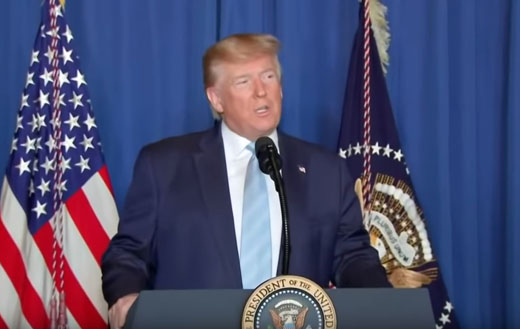by WorldTribune Staff, January 9, 2020
For 40 years, the United States would not hold the Iranian regime responsible for the terror proxies it funded, armed, trained, and directed.
President Donald Trump “put an end to that arrangement,” an analyst noted.

Since the targeted killing of Quds Force commander Qasem Soleimani, “Iran’s most important military proxy has begun taking credit for terror attacks committed nearly four decades ago,” Lee Smith noted in a analysis for Tabletmag.com.
It was Trump’s decisive action which showed “that Iran’s power is an illusion generated by D.C.’s willingness to look the other way,” Smith wrote.
Hizbullah-affiliated media and activists are now laying public claim to the terror organization’s responsibility for bombing the U.S. Marine barracks in Beirut in October 1983, which killed 241 Marines.
So why now?
“The answer is, to scare Americans now that Donald Trump has thrown the regime in Teheran off balance by changing the 40-year-old rules of the game,” Smith wrote. “The United States always knew that Hizbullah was responsible for the Marine barracks attack.”
The U.S. also knew that Hizbullah was funded by Iran.
President Ronald Reagan’s “decision not to respond directly to the attack was part of a tacit agreement that America and the Islamic Republic entered into during the 1979 U.S. Embassy takeover in Teheran,” Smith wrote. “It mirrored similar arrangements with the Soviet Union in which neither superpower held the other directly accountable for the actions of proxies in order to reduce the likelihood of a nuclear cataclysm.”
Smith continued: “Yet, unlike the Soviet Union, the Islamic Republic was hardly a globe-spanning nuclear superpower. It was merely a hostile local power that threatened the American regional security order through terror attacks. Washington’s response was to look away, under the theory that it was beneficial to the larger order to pretend, in public, that rules still existed. In turn, Iran was happy to play make-believe and accumulate prestige and leverage.
“The terms of this weird deal held fast for the next four decades, through the end of the Cold War, the collapse of the Soviet Union, the First and Second Gulf Wars, Bush’s occupation of Iraq, Obama’s Iran deal, and other local and global milestones.”
Washington wouldn’t hold Iran accountable for its terror proxies and, in exchange, “Iran and its partners would refrain from embarrassing the Americans by boasting about the murders they committed,” Smith wrote.
The founder of the Islamic Republic, Ayatollah Ruhollah Khomeini, famously said that America couldn’t do a damn thing. “It is more accurate to say our elected officials wouldn’t do a damn thing,” Smith noted.
Trump ended the four-decades-old arrangement “by commingling the dust of Soleimani together with that of one of his chief Arab lieutenants, Abu Mahdi al-Muhandis, head of one of Iran’s Iraqi terror proxies,” Smith wrote. “Now that Trump is holding Iran accountable for the actions its proxies taken in its name, the leverage gained by helping America play make-believe is gone. Iran and its allies now feel liberated to bathe publicly in the blood of Americans and warn that more violence is coming their way.”
Trump’s breaking of the old code, Smith noted, “has stripped Iran of the most important instrument in its arsenal — ‘plausible deniability.’ ”
“The threat that Iran poses to a superpower America is ‘asymmetric’ — kidnappings, embassy attacks, hijackings, bombings, etc., typically conducted by Iranian proxies,” Smith wrote. “The military experts and political scientists who coined the term usually fail to note that the ability to wage ‘asymmetric’ warfare is wholly dependent on an adversary’s willed blindness. If Iran’s targets decide to unsubscribe to the fiction that the Islamic Republic is not directly responsible for the actions of its proxies, Iran is rendered virtually powerless – with terror attacks being met with direct military hits on Iranian bases, airfields, ports, power plants, dams, and other infrastructure.”
Smith continued: “It is only because Americans and other Western powers have declined to call out Iran and have instead appeased it, that an obscurantist regime whose major exports are energy, pistachios — and terror, of course — appears like a formidable adversary.”
In holding Iran accountable, “Trump has knocked Iran down to its natural size — and likely made Americans safer from Iranian aggression than they have in fact been at any point in the last 40 years, during which Iranian proxies have repeatedly killed large numbers of Americans,” Smith wrote. “Killing Soleimani is a much more important operation than those targeting ISIS leader al-Baghdadi and even bin Laden, since it will likely shape the future actions of a state, not the leadership rotation of terror groups.”
Intelligence Brief __________ Replace The Media
